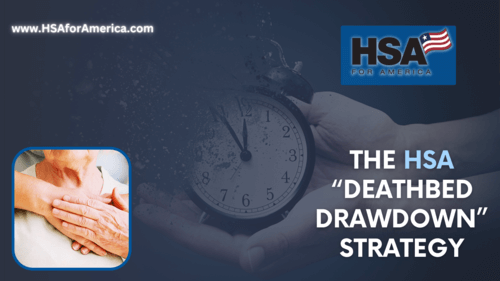The “Deathbed drawdown” is an important strategy to be aware of if you have a large health savings account balance towards the end of your life.

There’s a lot to like about the health savings account: Pre-tax contributions, self-directed investment options, tax-deferred growth, and tax-free distributions if you use the funds to pay qualified medical expenses.
But the health savings account (HSA) has one big disadvantage: It’s taxable immediately to non-spouse beneficiaries as ordinary income.
This blog post discusses some options to minimize the tax hit to non-spouse beneficiaries, and preserve as much of your financial legacy as possible for your loved ones – after accounting for taxes.
One of the chief options, of course, is the “deathbed drawdown” of HSA assets.
In a nutshell, if you’re over 65, you want to spend your HSA assets first, ahead of other more tax-efficient assets.
Ideally, you’ll spend them all on qualified medical expenses, so that there’s no income tax at all due on the distribution. But failing that, you still want to spend them down ahead of IRAs, 401(k)s, and personal assets.
Lean More: How Much Can An HSA Save in Taxes?
If you have a significant balance in your HSA – or you plan to have one in the future, by funding it as much as possible and self-directing your investments to maximize long-term returns, you should definitely do some end-of-life planning… before the end of your life.
Otherwise, you could stick your heirs with an unpleasant and unintended tax consequence.
Compare Pricing on the Best HSA Plans Available
The Problem With Leaving a Large HSA to Your Heirs
If you leave your HSA to your surviving spouse, there’s no problem. Your surviving spouse can adopt the HSA as his or her own, and the assets will continue their tax deferred growth. Your spouse will continue to enjoy all the benefits of the health savings account as if it were his or her own account all along.
But when the HSA is left to a non-spousal beneficiary, there’s a problem: at death, the account is stripped of its HSA status.
So instead of continuing to grow tax-deferred for the rest of the new account owner’s life, the HSA becomes taxable income incurred in the year the heir receives it. The inheritor must pay taxes on the entire lump sum.
The result is a nasty tax hit at the federal level. If your state has a state income tax, you’ll face a state income tax as well.
How Are Inherited HSAs Taxed?
Non-spousal inherited HSAs are not treated well under the tax code. Upon the death of the account owner, the HSA assets will be transferred to the designated beneficiary – who gets hit with an immediate income tax liability on the entire lump sum at once.
For this reason, it is important for HSA owners to make sure that they are using their HSA funds for qualified medical expenses as much as possible during their lifetime. This will help to maximize the tax benefits of the HSA for both the account owner and the beneficiary.
If you have any questions about the tax treatment of inherited HSAs, please consult with a qualified tax advisor.
No “Ten-Year Rule”
This immediate income tax on inherited non-spousal HSAs is a much less advantageous tax treatment than your heirs would receive if they inherited an IRA.
Under the SECURE Act, they can defer taxes on an inherited IRA for up to ten years, in most cases. That allows you to either take advantage of continued tax deferral, or spread the hit out over ten separate years, generally resulting in a lower effective tax rate in each year.
Naturally, the best asset you can leave to your heirs is life insurance. A life insurance death benefit to your heirs is liquid, immediate (not subject to probate), and nearly always tax free.
No “Stepped-Up Cost Basis”
Additionally, other assets in your estate may have to go through probate – a potentially lengthy and expensive process. But they also receive a step-up in cost basis. So your heirs won’t face a large capital gains tax hit if they or the probate executor sell the assets immediately upon death.
If your HSA balance is very large, you may have a significant amount of money left in it in your final days on this planet. Left unmanaged, your heirs could face a large and unnecessary tax bill.
If you own a large HSA, you should pay close attention to the order in which you draw down your retirement assets.
The planning goal here is to find ways to draw down your HSA instead of other more tax-efficient assets. So that you spend your HSA assets first, preserving more desirable assets (from a tax perspective) for your heirs.
The goal: minimize the money the IRS gets, and maximize the amount of money your heirs receive.
The Long-Term Growth HSA Strategy
The HSA is such a powerful tool for tax deferral that some advisors recommend not using the HSA to pay for qualified medical expenses if you can help it!
Instead, advisors from this school of thought recommend that you pay these out-of-pocket qualified medical expenses out of your own resources – possibly from taxable accounts. The idea is to preserve as much money as possible in your HSA to grow at tax-deferred rates.
You can always draw down the HSA to pay these old medical expenses years later. There’s no deadline: if you have an HSA, you can incur the medical expense now, pay it with money from your checking account today, and reimburse yourself from your HSA… 30 years later!
Meanwhile, you’re sitting on 30 years of tax-deferred growth. And now that you’re using your HSA to pay for a qualified medical expense, the amount of your HSA reimbursement is tax free!
But this strategy potentially leaves a large amount in the HSA.
In this case, as you get older, it’s a good idea to start taking those tax-free reimbursements from your health savings account.
This technique gives you the opportunity to move money from the high-tax HSA “bucket” (from your beneficiary’s perspective).
Learn More: Up Your HSA Game With These Three Self-Directed Investment Strategies
Example:
You opened your HSA 20 years ago. You maxxed out your contributions every year, and self-directed your investments within the HSA with great success. So now you have a sizable balance in your HSA.
A few years ago, you had a heart attack, and incurred $100,000 in qualified medical expenses.
You chose not to use your HSA to pay the bill. Instead, you liquidated an investment property at a loss and paid with that money. That transaction was tax free, and you used the loss to offset gains elsewhere in your portfolio. Meanwhile, you preserved as much as possible in the HSA to continue to grow tax-deferred.
This year, as you contemplate your own mortality (your doctor advises you to stop buying green bananas), you realize it’s time to start reimbursing yourself for those old medical expenses.
You have all the records, so you take a tax-free distribution of $100,000 from your HSA… and drop it in your old whole life insurance policy’s cash value.
Now, when you die, your HSA beneficiary will inherit a smaller HSA, but a much larger life insurance death benefit.
But the HSA would have been taxed as ordinary income at his or her 35% state and federal tax bracket.
The life insurance death benefit? It’s tax free.
Net savings: at least $35,000.
As an alternative, you could take the HSA reimbursement and keep it in cash. Then you and your heirs would probably only need to worry about inheritance taxes, and that only in a handful of states… and in a very few cases, estate taxes.
Another idea: you can take the reimbursement and pay down a mortgage, increasing your equity in property. Or you can buy a new property. You would have to pay capital gains tax on the sale of investment property while you’re alive. But if you plan to keep it, your heirs will receive a stepped-up cost basis.
All your taxable gains disappear, and your heir receives the full value of the property (minus mortgage debt), and starts over with a cost basis of zero.
If he or she sells the property immediately, before there’s any gain, there’s no tax.
That’s a much better net outcome than eating a 35% income tax hit on a lump sum from an inherited non-spousal IRA.
The “Deathbed Drawdown” Strategy
If your health is failing, and you have some advance notice, you can take steps to ensure your HSA assets are drawn down first, before other assets.
First, you can go back and identify an unlimited amount of qualified medical expenses dating back to the time you first opened your HSA. Reimburse yourself dollar-for-dollar for these qualified medical expenses.
The reimbursements will be tax free. And you can then use the money for any purpose.
If you still have significant assets in your HSA, it’s wise to start using that money for your other routine expenses, too, including basic living expenses, a dream vacation, or anything else on your “bucket list.”
If you’re going to spend the money anyway, spend down the HSA first, rather than other assets.
You should also let your heirs know about your HSA, and ensure that they know that your strategy is to spend down the HSA on medical expenses before other assets.
You may want to sign springing power of attorney documents, alongside a living will or health care power of attorney, to ensure that in the event you are incapacitated, a trusted individual is able to see that ongoing medical expenses and other expenses are paid out of the HSA first, before drawing down more tax advantageous assets, preserving more for your heirs and exposing less to the IRS.
Note: You cannot use your HSA to reimburse yourself tax-free for any medical expenses you’ve claimed as a tax deduction in a prior year, or that have been reimbursed to you by insurance or any other source.
This means that you may need to retain many years of tax returns, in case you need to prove that you did not take a prior years’ medical expense as a tax deduction.
HSA Tax Arbitrage
Another planning technique considers the marginal income tax rates of both the original HSA owner and the beneficiary.
If you have multiple potential heirs, one idea is to make the heir with the lowest marginal income tax rate the beneficiary, and have the heirs in higher income tax brackets inherit other assets, to even things out.
Your HSA beneficiary could even be a minor child (with a trustee), student, or a real estate professional with large paper losses (thanks, depreciation!) that could offset the ordinary income from an inherited HSA. Or anyone else with a relatively low AGI that qualifies for a low tax bracket.
The “Final Twelve Months” Rule
Most non-spouse beneficiaries of large HSAs are disappointed to find out they face a full state and federal ordinary income tax hit on their inherited asset.
However, there is a silver lining: the Twelve-Month Rule.
Using this rule, a non-spouse HSA beneficiary can reduce the tax the taxable value of the HSA by the amount of any qualified medical expenses that were incurred before the date of the decedent’s death, and paid by the beneficiary within one year after the decedent’s death.
It is important to note that this is a very narrow exception. Only qualified medical expenses that are paid by the beneficiary within one year of the death of the account owner can be used to reduce the taxable value of the HSA. Any other expenses will not be eligible for this treatment.
However, if death is sudden and unexpected – a heart attack, stroke, or accident out of the blue – there may be very little in the way of end-of-life medical expenses. This could leave the beneficiary facing an immediate tax hit of up to 40% or more on the inherited HSA balance.
Note: If you don’t have a named beneficiary on the HSA at all, then the entire amount is taxable as part of your final income tax return “in respect of a decedent.” So the tax will still be paid before your estate clears probate.
Your heirs will still eat the tax bill, indirectly. It’s just that your estate will pay it before they see the money. But they won’t have the opportunity to use the HSA money to pay down your last 12 months of medical expenses to reduce the HSA’s taxable value.
And they will have to wait weeks or months for the money.
In all cases, it’s much better to have a designated beneficiary on your HSA and other retirement accounts.
Designated beneficiaries bypass probate, and can get their money in days, not months. And have more choices when it comes to managing their tax liability.
Compare Pricing on the Best HealthShare Plans Available
What To Do Now
It’s never too early to start planning.
A few things to consider: update your HSA designated beneficiaries, along with the beneficiaries on all your retirement accounts, bank accounts, life insurance policies, and annuities. Consider designating alternate and contingent beneficiaries as well.
Make sure your money will go to your intended heirs, and not to an estranged ex-spouse. Also you can ensure that you don’t accidentally disinherit a non-adopted stepchild or other loved one.
Establish or update your living will, last will and testament, and power of attorney documents.
And consider owning some permanent life insurance. This is life insurance that lasts as long as you live. It doesn’t become unaffordable or turn into a pumpkin when you reach age 70, like term insurance does.
Premiums are higher. But permanent life insurance builds cash value that you can use for any purpose, if needed. And it gives you a great tax-free option to pass on to your heirs as your financial legacy.
Need help? Have questions? We’re here to help. Simply contact an HSA For America Personal Benefits Manager for a free consultation.
This conversation could save you and your heirs many thousands of dollars in needless income taxes.
Disclosure: HSA For America does not provide individualized tax advice. The information in this article is for general knowledge purposes only, and should not be construed to constitute a personal recommendation.
For information pertaining to your specific circumstances, you should consult a qualified tax professional.
For Further Reading: What Happens to Health Savings Accounts When The Owner Dies? A Guide for Beneficiaries of Inherited HSAs | AT LAST! You Can Combine Health Sharing With HSAs! Here’s How | How To Use Your HSA To Pay for OTC Medication

Hi! I’m Mike Montes, and I’m one of your Personal Benefits Managers. I like working with HSA for America because we’re creating solutions to healthcare problems. Our focus on money-saving alternatives like HSA plans and health sharing programs, and the variety of health share programs we offer, are what set us apart. Read more about me on my Bio page.


